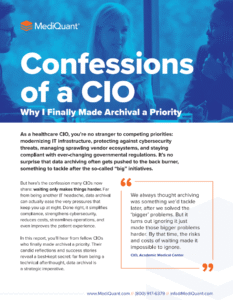Generative AI Underlines Continuing Value of Healthcare Data Archiving Solutions
Written By: Jim Jacobs, President and CEO, MediQuant
An AI platform that turns clinicians notes into structured data within seconds. A virtual assistant that gathers 20,000 nurse handoffs per shift.
AI in healthcare is no longer just hype — it’s actively being implemented to enhance clinical care and operational efficiency. Generative AI offers health systems and hospitals the ability to derive more value from patient claims, monitor payers more closely, equip physicians with useful information at the point of care, and much more.
Driving these advancements, however, requires relevant data — even hospital archive data from 10 or more years ago — that has been normalized and made available to current software. Preserving data in a central repository ensures it’s continually accessible and usable by hospitals to bolster finances, improve workflows, and take better care of patients.
1. Keeping Payer Scorecards for Oversight

2. Recovering Revenue Via Denial Management
3. Helping Physicians at the Point of Care
How Health Data Archiving Enables Data Usefulness
Many hospital executives still imagine an archive at the center of various legacy systems, with arrows pointing from legacy systems to a central repository where information is stored as systems are retired. There are no arrows leading from the repository. In this view, an archive is static, the place where archived data goes to die.
With the rise of generative AI, however, executives are realizing that historic data retains its value for much more than compliance and release-of-information use. While arrows should lead from legacy applications to the data repository, arrows should also emanate from the repository, fueling secondary uses that include billing and collections, patient care, claims management, and medical research.

But not all healthcare data archiving solutions are created equal. For data to be useful for secondary purposes and tactical use cases, it must be discrete, accurate, and reliable — traits that not all archive vendors can meet.
More Thought-Leadership
How Healthcare Data Archiving Solutions Can Reduce Technical Debt During M&A Activities
Every organization faces the challenge of technical debt, but it’s especially tough for hospitals and health systems. Managing hundreds of IT applications is not easy, especially when each one plays a critical role. Technical debt refers to the future costs and...
Leveraging Healthcare Data Archiving for Competitive Advantage: 5 Post M&A Considerations for Healthcare Organizations
Written By: Cindy Adkins (CRCR, CPC, CSPPM), Director, Revenue Cycle Solutions, MediQuantIf you’re a digital health leader for a large hospital or health system, chances are you’re either anticipating or have already been impacted by mergers and acquisitions...
The healthcare data paradox: Driving innovation while managing legacy systems
In Collaboration with Becker's Hospital Review Healthcare organizations are at a critical inflection point: the industry is generating about one-third of the world's data, but health systems need new ways to make that information actionable to support value-based and...
Contact Us Today








